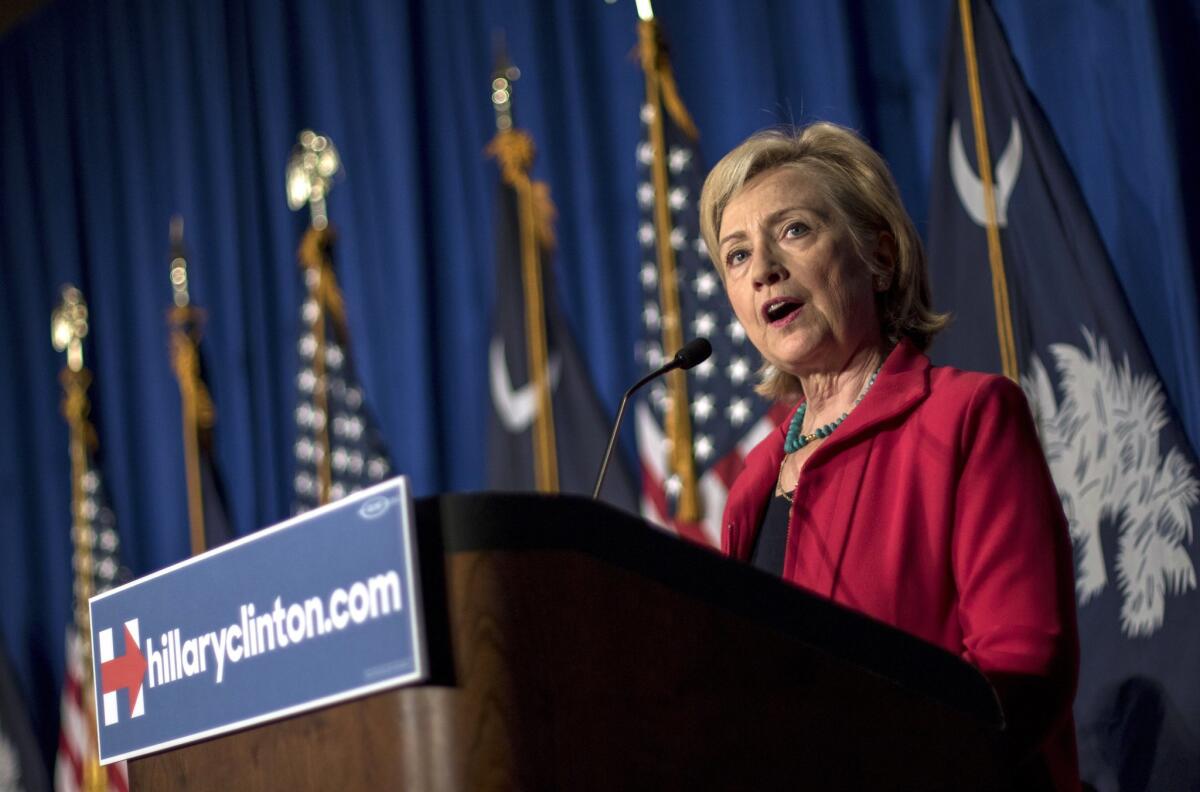Federal investigators want Justice Department probe of Hillary Clinton emails

Democratic presidential hopeful Hillary Rodham Clinton speaks July 22 at a campaign event in Columbia, S.C.
- Share via
Reporting from Washington — Whatever benefit Hillary Rodham Clinton got out of using her personal email to conduct government business while she was secretary of State, that advantage is surely receding as the headache it has created for her presidential campaign grows and grows.
Public attention is focused yet again on Clinton’s email problem, after government investigators revealed late this week that her use of a personal server to conduct business during her time at the State Department led to classified information getting breached.
TRAIL GUIDE: All the latest news on the 2016 presidential campaign >>
The Department of Justice said it is weighing whether to launch its own investigation after the inspector general for intelligence agencies notified the agency that classified information that went through the account appeared to have been mishandled. Administration officials and investigators declined to share details about the emails. But in a separate memo to lawmakers, the inspector general said that a review of just 40 of the 30,000 emails from the Clinton server found that four had information that should have been marked and handled as classified.
Clinton has made many assurances in recent months that she did not send or receive classified information on her personal server. Her campaign says the material in question had not been specifically marked as classified and, thus, Clinton broke no rules. The inspector general disputed that characterization in a statement late Friday, saying that the information in the emails was classified at the time, even if it wasn’t marked as such, and shouldn’t have been transmitted on a personal email system.
Even so, the revelation was an uncomfortable one for the candidate. And national security experts said the disclosure that that material that should have been marked classified made its way to Clinton’s personal email account at the very least fuels legitimate speculation about how the server was used.
“It tells us why this was such a bad idea,” said Stewart A. Baker, a former general counsel to the National Security Agency now in private practice. “It raises questions.”
Among them, Baker said, was whether staffers deliberately avoided marking sensitive emails to Clinton as classified so they could sidestep the bureaucrats who handle transmission of such material.
“She skipped the government circles and nobody was overseeing this and nobody was saying, ‘This info should not be on this system,’” Baker said. “If anything, there was an incentive for people to cross the line without making clear they were doing so.”
The Clinton campaign was in full damage-control mode Friday, sharply criticizing the media’s coverage of the candidate’s latest email problem. Operatives attacked the New York Times, which broke the story late Thursday night, for reporting that federal prosecutors were weighing a criminal probe. The Department of Justice said the matter is not criminal, as did the inspector general who made the referral.
The agency refused, though, to provide details, acknowledging only that the matter did involve classified information potentially being compromised. At a State Department briefing, reporters grew increasingly impatient with a spokesman who responded to repeated questions about the issue by offering no useful information.
Clinton, meanwhile, took a shot at the media from the lectern as she prepared to deliver a major speech on the economy.
“Maybe the heat is getting to everybody,” Clinton said. “We all have a responsibility to get this right.” She noted that she has turned over 55,000 pages of emails from her personal server to the Obama administration and has agreed to answer questions about her use of email before congressional investigators.
The Department of Justice may or may not ultimately launch an investigation. Experts say such referrals from an intelligence agency inspector general are routine and often do not lead to much. But the referral itself became a problem for Clinton after the inspector general who drafted it, I. Charles McCullough, explained some of his overall concerns in a memo to lawmakers Friday.
He noted there were emails Clinton turned over to the State Department that did, indeed, contain messages with sensitive information.
“We note that none of the emails we reviewed had classification or dissemination markings, but some included ... classified information and should have been handled as classified, appropriately marked and transmitted via a secure network,” the letter said.
It made clear that even if Clinton did take care not to accept or send messages marked as classified, messages that never should have been on her server landed there.
McCullough’s note also points out that Clinton’s attorney, David Kendall, still appears to have those emails on an unclassified system. “The 30,000 emails in question are purported to have been copied to a thumb drive in the possession of former Secretary Clinton’s personal counsel,” the letter said.
Staff writers Timothy M. Phelps and Paul Richter in Washington and Brian Bennett in Aspen, Colo., contributed to this report.
More to Read
Sign up for Essential California
The most important California stories and recommendations in your inbox every morning.
You may occasionally receive promotional content from the Los Angeles Times.











